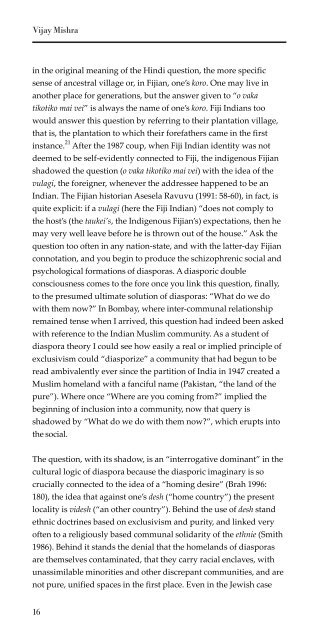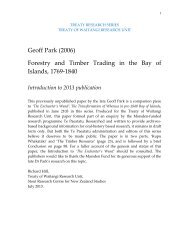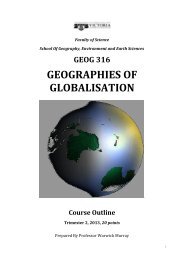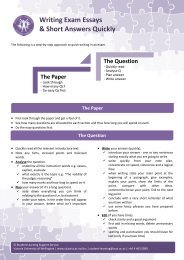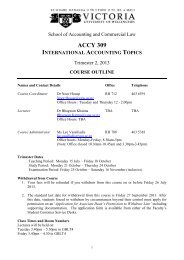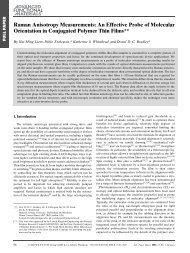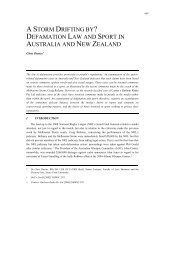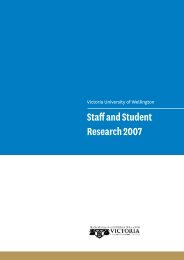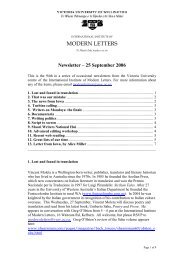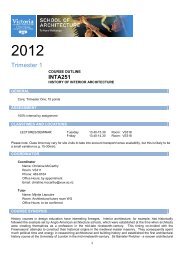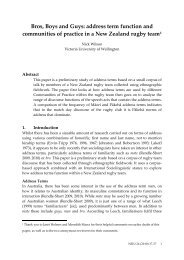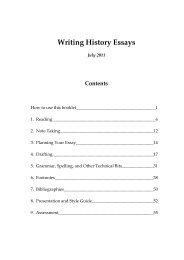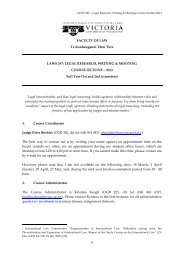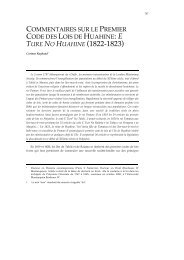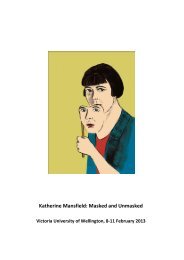The Diasporic Imaginary and the Indian Diaspora - Victoria ...
The Diasporic Imaginary and the Indian Diaspora - Victoria ...
The Diasporic Imaginary and the Indian Diaspora - Victoria ...
You also want an ePaper? Increase the reach of your titles
YUMPU automatically turns print PDFs into web optimized ePapers that Google loves.
Vijay Mishra<br />
in <strong>the</strong> original meaning of <strong>the</strong> Hindi question, <strong>the</strong> more specific<br />
sense of ancestral village or, in Fijian, one’s koro. One may live in<br />
ano<strong>the</strong>r place for generations, but <strong>the</strong> answer given to “o vaka<br />
tikotiko mai vei” is always <strong>the</strong> name of one’s koro. Fiji <strong>Indian</strong>s too<br />
would answer this question by referring to <strong>the</strong>ir plantation village,<br />
that is, <strong>the</strong> plantation to which <strong>the</strong>ir forefa<strong>the</strong>rs came in <strong>the</strong> first<br />
instance. 21 After <strong>the</strong> 1987 coup, when Fiji <strong>Indian</strong> identity was not<br />
deemed to be self-evidently connected to Fiji, <strong>the</strong> indigenous Fijian<br />
shadowed <strong>the</strong> question (o vaka tikotiko mai vei) with <strong>the</strong> idea of <strong>the</strong><br />
vulagi, <strong>the</strong> foreigner, whenever <strong>the</strong> addressee happened to be an<br />
<strong>Indian</strong>. <strong>The</strong> Fijian historian Asesela Ravuvu (1991: 58-60), in fact, is<br />
quite explicit: if a vulagi (here <strong>the</strong> Fiji <strong>Indian</strong>) “does not comply to<br />
<strong>the</strong> host’s (<strong>the</strong> taukei’s, <strong>the</strong> Indigenous Fijian’s) expectations, <strong>the</strong>n he<br />
may very well leave before he is thrown out of <strong>the</strong> house.” Ask <strong>the</strong><br />
question too often in any nation-state, <strong>and</strong> with <strong>the</strong> latter-day Fijian<br />
connotation, <strong>and</strong> you begin to produce <strong>the</strong> schizophrenic social <strong>and</strong><br />
psychological formations of diasporas. A diasporic double<br />
consciousness comes to <strong>the</strong> fore once you link this question, finally,<br />
to <strong>the</strong> presumed ultimate solution of diasporas: “What do we do<br />
with <strong>the</strong>m now?” In Bombay, where inter-communal relationship<br />
remained tense when I arrived, this question had indeed been asked<br />
with reference to <strong>the</strong> <strong>Indian</strong> Muslim community. As a student of<br />
diaspora <strong>the</strong>ory I could see how easily a real or implied principle of<br />
exclusivism could “diasporize” a community that had begun to be<br />
read ambivalently ever since <strong>the</strong> partition of India in 1947 created a<br />
Muslim homel<strong>and</strong> with a fanciful name (Pakistan, “<strong>the</strong> l<strong>and</strong> of <strong>the</strong><br />
pure”). Where once “Where are you coming from?” implied <strong>the</strong><br />
beginning of inclusion into a community, now that query is<br />
shadowed by “What do we do with <strong>the</strong>m now?”, which erupts into<br />
<strong>the</strong> social.<br />
<strong>The</strong> question, with its shadow, is an “interrogative dominant” in <strong>the</strong><br />
cultural logic of diaspora because <strong>the</strong> diasporic imaginary is so<br />
crucially connected to <strong>the</strong> idea of a “homing desire” (Brah 1996:<br />
180), <strong>the</strong> idea that against one’s desh (“home country”) <strong>the</strong> present<br />
locality is videsh (“an o<strong>the</strong>r country”). Behind <strong>the</strong> use of desh st<strong>and</strong><br />
ethnic doctrines based on exclusivism <strong>and</strong> purity, <strong>and</strong> linked very<br />
often to a religiously based communal solidarity of <strong>the</strong> ethnie (Smith<br />
1986). Behind it st<strong>and</strong>s <strong>the</strong> denial that <strong>the</strong> homel<strong>and</strong>s of diasporas<br />
are <strong>the</strong>mselves contaminated, that <strong>the</strong>y carry racial enclaves, with<br />
unassimilable minorities <strong>and</strong> o<strong>the</strong>r discrepant communities, <strong>and</strong> are<br />
not pure, unified spaces in <strong>the</strong> first place. Even in <strong>the</strong> Jewish case<br />
16


